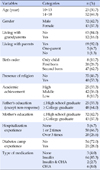Abstract
Purpose
This study was conducted to identify the disease adaptation and related factors for the pediatric patients with diabetes mellitus.
Methods
Participants in this study were 75 diabetic children or adolescent whose age were 10 to 18 years old visited the out-patient clinic in one general hospital located in Seoul. Data were collected using self-report questionnaires. Research tools measuring resilience, family support, psychological adaptation, Hemoglobin A1c (HbA1c) protein were used.
Results
Resilience showed significant differences according to the age, gender, academic achievement, and hospitalization experience of the children. Family support was significantly different according to the age, religion, academic achievement, fathers' education level, and hospitalization experience of the children. Psychological adaptation to diabetes showed significant differences according to academic achievement. HbA1c was shown to be significant difference according to fathers' education level and hospitalization experience of the children. Positive correlations were identified among resilience, family support, and psychosocial adaptation, while negative correlations were found between HbA1c and all others including resilience, family support, and psychosocial adaptation.
Figures and Tables
References
1. Diabetes.or.kr [Internet]. Diabetes fact sheet in Korea. Seoul: Korea Diabetes Association;2012. cited 2012 Dec 3. Available from: http://www.diabetes.or.kr/general/index.html.
2. Yeoum WS. The changing tendency of types of diabetes mellitus in children and adolescents [dissertation]. Seoul: Yonsei University;2007.
3. Kim DH. Development of an instrument to measure resilience in children with chronic illness [dissertation]. Seoul: Yonsei University;2003.
4. Sim HO. A study of the correlation between self-esteem and self-care in the school age child and adolescents [dissertation]. Seoul: Yonsei University;1993.
5. Tusaie K, Dyer J. Resilience: a historical review of the construct. Holist Nurs Pract. 2004; 18(1):3–8. DOI: 10.1097/00004650-200401000-00002.
6. Hong SK. Concept development of resilience: focusing on cancer patients. J Korean Acad Soc Nurs Educ. 2009; 15(1):109–119. DOI: 10.5977/jkasne.2009.15.1.109.
7. Reynolds KA, Helgeson VS. Children with diabetes compared to peers: depressed? distressed?: a meta-analytic review. Ann Behav Med. 2011; 42(1):29–41. DOI: 10.1007/s12160-011-9262-4.
8. Kwon EK. A study on the impact of stress and self-concept on self-care among adolescents with juvenile diabetes [dissertation]. Seoul: Ewha Womans University;2003.
9. Rhee CW. Family factors affecting children's chronic illness management. J Korean Soc Child Welf. 2004; 18:217–242.
10. Atwool N. Attachment and resilience: implications for children in care. Child Care Pract. 2006; 12(4):315–330. DOI: 10.1080/13575270600863226.

11. Whittemore R, Jaser S, Guo J, Grey M. A conceptual model of childhood adaptation to type 1 diabetes. Nurs Outlook. 2010; 58(5):242–251. DOI: 10.1016/j.outlook.2010.05.001.

12. Kim DH, Yoo IY. Relationship between depression and resilience among children with nephrotic syndrome. J Korean Acad Nurs. 2004; 34(3):534–540. DOI: 10.4040/jkan.2004.34.3.534.

13. Jeon NY. Adjustment of teenagers with cancer: a path analysis of related variables [dissertation]. Seoul: Yonsei University;2001.
14. Sim MK, Shin YH, Kim TI. Resilience, coping and adjustment to illness in children with chronic illness. Child Health Nurs Res. 2006; 12(2):151–159.
15. Kim YJ. A study on the relation between family support and self-care behavior of type II diabetics [dissertation]. Seoul: Kyung Hee University;2000.
16. Park KS, Moon JS, Park SN. Self-care, family support and depression in elderly patients with diabetes mellitus. J Korean Acad Fundam Nurs. 2009; 16(3):345–352.
17. Choi YO. Correlationships between family support, selfcare behaviors and quality of life in middle aged adults with diabetes mellitus [dissertation]. Seoul: Ewha Womans University;2002.
18. Cobb S. Social Support as a moderate of life stress. Psychosom Med. 1976; 38(5):300–314.
19. Park OJ. The effect of social support on compliance with sickrole behavior in diabetic patients [dissertation]. Seoul: Yonsei University;1985.
20. Oh JA. Disease adaptation and self-esteem of hospitalized schooler. Nurs Sci. 2003; 15(1):22–30.
21. Challen AH, Davies AG, Williams RJ, Haslum MN, Baum JD. Measuring psychosocial adaptation to diabetes in adolescence. Diabet Med. 1988; 5(8):739–746.

22. Daviss WB, Coon H, Whitehead P, Ryan K, Burkley M, McMahon W. Predicting diabetic control from competence, adherence, adjustment, and psychopathology. J Am Acad Child Adolesc Psychiatry. 1995; 34(12):1629–1636. DOI: 10.1097/00004583-199512000-00013.

23. Song SM. The effects of eclectic filial therapy for children with insulin-dependent diabetes mellitus: psychosocial adjustment, treatment adherence, and metabolic control [dissertation]. Seoul: Chung-Ang University;2010.
24. Lazarus RS, Folkman S. Stress, appraisal, and coping. New York: Springer;1984.
25. Amc.seoul.kr [Internet]. Childhood diabetes education, overview of diabetes care. Seoul: Asan Medical Center;2015. cited 2015 Dec 3. Available from: http://peddm.amc.seoul.kr/asan/depts/peddm/K/content.do?menuId=2379.
26. Baek KW. A study about resilience in children with chronic illness and family resilience [dissertation]. Seoul: Chung-Ang University;2005.
27. Choi YH. Effects of camping programs on self-efficacy and sick-role behavioral compliance in juvenile diabetes mellitus patient. Korean J Health Educ Promot. 1997; 14(2):59–68.
28. Cheung R, Cureton VY, Canham DL. Quality of life in adolescents with type 1 diabetes who participate in diabetes camp. J Sch Nurs. 2006; 22(1):53–58. DOI: 10.1177/10598405060220010901.

29. Lim SC. The effects of adolescent's perception with type 1 diabetes of main caregiver's communication on self-care: mediating effect of main caregiver's support [dissertation]. Seoul: Soongsil University;2010.
30. Vinson JA. Children with asthma: initial development of the child resilience model. Pediatr Nurs. 2002; 28(2):149–158.




 PDF
PDF ePub
ePub Citation
Citation Print
Print







 XML Download
XML Download